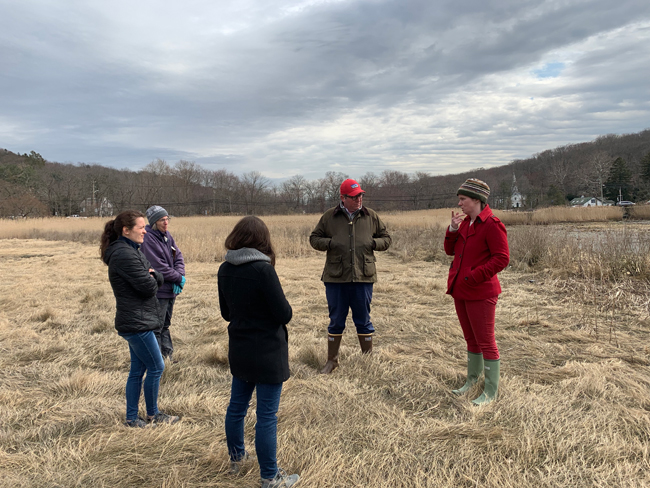
NYSG Sustainable and Resilient Communities Extension Professionals meet with stakeholders to discuss restoration of St. John’s Marsh in Cold Spring Harbor, NY. Credit: NYSG
Contacts:
Elizabeth Hornstein, Sustainable and Resilient Communities Specialist, Suffolk County, E: eeh78@cornell.edu, Phone: (631) 632-8730
Sarah Schaefer-Brown, Sustainable and Resilient Communities Specialist, Nassau County, E: scs292@cornell.edu, Phone: (516) 832-2591
Sara Powell, Sustainable and Resilient Communities Specialist, Westchester County, E: slp285@cornell.edu, Phone: (914) 285-4620
NYSG Sustainable and Resilient Communities Extension Professionals facilitated a needs assessment to understand climate-related environmental challenges and barriers to action in Long Island Sound communities
Stony Brook, NY, March 23, 2023 - The Long Island Sound Study (LISS), a United States Environmental Protection Agency (EPA)-funded program created to protect and restore Long Island Sound, identifies Sustainable and Resilient Communities (SRC) as one of four themes in its Comprehensive Conservation and Management Plan. Many communities in the Long Island Sound region have begun to consider sustainability and resilience in their planning efforts but the current rate of project implementation is insufficient to match the pace of impacts from climate change and other challenges facing the region.
In 2022, New York Sea Grant (NYSG) and Connecticut Sea Grant SRC Extension Professionals conducted a needs assessment of more than 300 regional stakeholder entities to better understand the current environmental challenges Long Island Sound communities face and the barriers to advancing sustainability and resilience efforts.
The most prominent environmental threat identified across the Long Island Sound region was stormwater and associated flooding. Identified barriers to implementing desired actions included limited capacity, inefficient coordination, a lack of political will/leadership, funding and burdensome grant requirements, and institutional inequities. Identified needs included increased leadership/local champions, more funding and resources, technical expertise, coordinated approaches to planning, sharing of experiences/case studies, assistance with identifying relevant funding opportunities and tools, a step-by-step guide of “what to do,” and increased education for all stakeholder groups on a variety of environmental/climate issues.
The findings from this regional needs assessment will enable NYSG’s SRC team to create training, education, and extension products that are tailored to the needs of Long Island Sound stakeholders. This will result in a more coordinated regional response to climate change impacts, better-trained and informed community decision makers, increased implementation of sustainability and resilience projects, and an engaged community acting as stewards of Long Island Sound resources.
Partners:
• Connecticut Sea Grant
• Cornell Cooperative Extension Westchester County
• Cornell Cooperative Extension Nassau County
• Stony Brook University
Funding:
• Long Island Sound Study
• U.S. Environmental Protection Agency
More Info: Follow-up From 1st Annual SRC Workshop
The LIS Resilience Grant Writing Assistance Program was also highlighted at the “1st Annual Long Island Sound (LIS) Sustainable & Resilient Communities Workshop”, which was held virtually on December 1, 2022.
The event brought together local government, Indigenous, tribal, and community leaders, nonprofits, and other stakeholders from New York and Connecticut to learn more about opportunities to increase the resilience of coastal Long Island Sound communities to various environmental challenges.
Sessions included: tips for success with Long Island Sound funding opportunities, information on a new grant-writing assistance program, and breakouts for focused discussion on shoreline planning, using green infrastructure for stormwater management, strategic climate planning/relocation, and new tools for NY and CT communities.
Check out the playlist for recordings from throughout the workshop ...
Videos included in the playlist above ...
• Main Session — This video includes the SRC Team presentation as well as a Funding session that featured two guest speakers. NOTE: Funding Session begins at the 58 minute mark.
• Shoreline Planning Session
• Green Infrastructure for Stormwater Management Session
• Strategic Planning for Climate Relocation Session
• CT Tools Session
• NY Tools Session
More Info: New York Sea Grant
New York Sea Grant (NYSG), a cooperative program of Cornell University
and the State University of New York (SUNY), is one of 34 university-based
programs under the National Oceanic and Atmospheric Administration’s
National Sea Grant College Program.
Since 1971, NYSG has represented a statewide network of integrated
research, education and extension services promoting coastal community
economic vitality, environmental sustainability and citizen awareness
and understanding about the State’s marine and Great Lakes resources.
Through NYSG’s efforts, the combined talents of university scientists
and extension specialists help develop and transfer science-based
information to many coastal user groups—businesses and industries,
federal, state and local government decision-makers and agency managers,
educators, the media and the interested public.
The program maintains Great Lakes offices at Cornell University, SUNY
Buffalo, SUNY Oswego and the Wayne County Cooperative Extension office
in Newark. In the State's marine waters, NYSG has offices at Stony Brook
University in Long Island, Brooklyn College and Cornell Cooperative
Extension in NYC and Kingston in the Hudson Valley.
For updates on Sea Grant activities: www.nyseagrant.org has RSS, Facebook, Twitter, Instagram, and YouTube links. NYSG offers a free e-list sign up via www.nyseagrant.org/nycoastlines for its flagship publication, NY Coastlines/Currents, which is published quarterly.